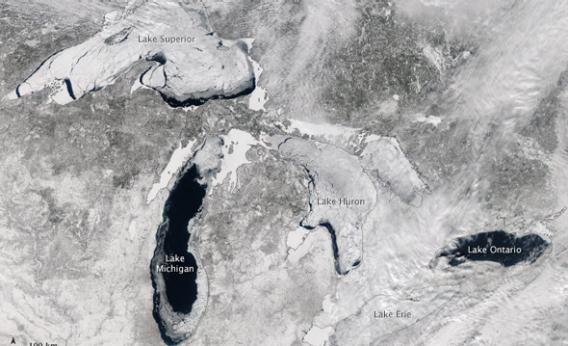Create a free profile to get unlimited access to exclusive videos, sweepstakes, and more!
Great Lakes Get Deepest Freeze in Two Decades

We live in an age of ironies: While the Earth warms up, some local areas get incredibly cold. Anyone suffering through the recent polar vortex excursions (and another is on its way) knows that.
The U.S. Midwest has suffered the brunt of this. Every year, it gets cold enough for long enough that some amount of the Great Lakes freezes, but this year about 88 percent of the surface area of the lakes was frozen—an amount not seen since 1994!
The image above was taken by NASA’s Aqua, an Earth-observing satellite designed to map out water on our planet. It’s a natural color image and shows the extent of the freezing. It’s a bit hard to tell the difference between ice, snow, and clouds, so Aqua helpfully also took images using infrared filters, making the features easier to distinguish:
Different wavelengths (colors, if you will) of infrared light are absorbed and reflected differently by the features below, making it easier to tell them apart. In this case, water is deep blue, ice is pale blue (where it’s thicker it looks brighter), snow is blue-green, and clouds are blue-green or white.
As you can see, a lot of water is covered, some of it in pretty substantial ice sheets. If they hadn’t labeled Lake Erie, I would’ve missed it.
Given these waves of cold that have hit the area, you might expect January to have been cooler than average. However, and perhaps somewhat counter-intuitively, this last January was actually the fourth-warmest on record! While the Midwest was shivering, other parts of the world were cooking; Alaska, for example, is still dealing with record heat. In the end, warming offset cooling across the globe.
The freezing of the lakes is only partly due to the polar vortex shenanigans; even in November 2013 freezing had begun. The amount the lakes freeze every year is pretty variable, as I recall from when I lived in Chicago and later in Ann Arbor, Mich. And folks who live east of the area may be thankful: With ice covering the open water, the famed (and dreaded) “lake-effect snow” may be reduced. Less open water means less water vapor to be picked up by winds and dumped as snow. I’ll note that Michigan may still suffer from that, since Lake Michigan looks mostly open. I’ll be curious to see regional snowfall amounts when all this is done.
In the meantime, wacky weather rages on. Here in Boulder, Colo., we’re dealing with high winds off the mountains; they blow all day and rage at night (they woke up my wife and me many times over the past few nights). I flew back from Boston the other day and the landing was … interesting (if you define interesting as terrifying). We’re flying to Tucson, Ariz., for a Science Getaways vacation next week. I hope things settle down by then.


























